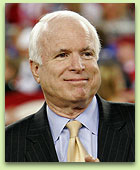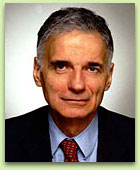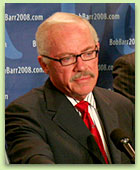
See at a glance where the presidential contenders stand on climate and energy issues
Scroll down to compare the views of presidential candidates on climate and energy issues. Or narrow the chart down to compare just two: you can click on a candidate’s picture to make their row disappear, then click here to restore the full chart.
Find out more about candidates’ environmental stances in Grist’s special election series: How Green Is Your Candidate? (And click here for info about the candidates who’ve dropped out of the race.)
| Candidate | Cap-and-trade program for greenhouse-gas emissions | Offshore drilling | Fuel-economy standards for automobiles | Renewable energy | Biofuels | Coal | Nuclear energy |
 Barack Obama, Barack Obama,Democrat interview, fact sheet |
Supports a cap-and-trade system to cut U.S. emissions 80% below 1990 levels by 2050. Would auction off 100% of emission credits, making polluters pay for the right to emit greenhouse gases. | Generally opposes opening additional U.S. waters to offshore oil drilling, but says he would consider it as part of a comprehensive energy plan that includes incentives for renewable energy. | Supports raising fuel-economy standards 4% — roughly one mile per gallon — each year. Proposes spending $4 billion to help U.S. automakers upgrade their plants to produce more efficient cars and trucks. | Calls for getting 10% of U.S. electricity from renewables by 2012, and 25% by 2025. Proposes investing $150 billion over 10 years in renewables, advanced biofuels, efficiency, and other clean tech, and says this will help create 5 million green jobs. | Calls for 60 billion gallons of “advanced biofuels” [PDF] like cellulosic ethanol to be produced in the U.S. each year by 2030. Proposes federal tax incentives and other inducements to help develop the advanced biofuels. | Supports “clean coal.” Supports coal-to-liquid fuels if they emit 20% less carbon over their lifecycle than conventional fuels. Says he would use “whatever tools are necessary to stop new dirty coal plants from being built in America — including a ban on new traditional coal facilities.” | Has said we should explore nuclear power as part of the energy mix, but has also said nuclear is not a great optionbecause of problems with safety and storage and because it usually requires big government subsidies. |
 John McCain, John McCain,Republican interview, fact sheet |
Supports a cap-and-trade system to cut U.S. emissions 60% below 1990 levels by 2050. Would give away many emission credits at the start of his plan, though down the line he would phase in auctions of such credits. Would allow domestic and international offsets as a form of compliance. | Calls for lifting the federal ban on offshore oil drilling in new areas. (Had opposed new offshore drilling until June 2008.) | Says he would more effectively enforce existing fuel-economy standards. Said in 2007 that standards need to be raised, but has not offered specific targets. | Supports renewables, but has not offered specific targets. | Supports increased use of biofuels, but has not offered specific targets. Opposes subsidies for ethanol. | Supports “clean coal.” Proposes spending $2 billion a year to help develop clean-coal technologies. | Calls for 45 new nuclear power plantsto be built in the U.S. by 2030, ultimately increasing to 100 new plants. Calls for government support for the nuclear industry. |
 Ralph Nader, Ralph Nader,Independent interview, fact sheet |
Supports a carbon tax instead of a cap-and-trade program, with a goal of cutting U.S. emissions at least 80% below 1990 levels by 2050. Would auction off emission credits starting at $50 per ton of carbon-dioxide equivalent, making polluters pay for the right to emit greenhouse gases. | Opposes opening additional U.S. waters to offshore oil drilling, and calls for “a full reevaluation of energy development in our offshore waters.” | Supports raising fuel-economy standards. In 2000 and 2004, called for increasing standards for cars to 45 miles per gallon and light trucks to 35 mpg, to be phased in over five years. | Calls for heavy investment in renewable energy, particularly wind and solar power. | Calls for an end to biofuels subsidies, especially for “wasteful corn ethanol.” | Calls for moving away from coal power and ending all coal subsidies. Has also disparaged mountaintop-removal mining and criticized the Bush administration for what he says is its lax approach to coal-mine safety. | Opposes nuclear power. |
 Cynthia McKinney, Cynthia McKinney,Green interview |
Calls for fighting climate change and attaining carbon neutrality within 20 years, but has not released a specific plan. | Opposes offshore oil drilling. | Supports raising fuel-economy standards, but has not offered specific targets. | Calls for government investment in solar and other renewable energy sources. | Has expressed support for biofuels, but has no clearly articulated position. | Calls for independence from fossil fuels. | Opposes nuclear power. |
 Bob Barr Bob BarrLibertarian interview |
Opposes a cap-and-trade system. Says, “It makes far more sense to use American ingenuity and technology to adapt to future changes in the climate than to wreck the economy in order to prevent temperature increases that may never occur.” | Calls for lifting all restrictions on offshore oil drilling. | Opposes federal fuel-economy standards. | Supports “alternative sources of energy,” and says their development should be driven by the private sector. | Calls for eliminating subsidies and government support for ethanol. | Supports coal-to-liquid fuels. | Supports nuclear power. |
| Candidate | Cap-and-trade program for greenhouse-gas emissions | Offshore drilling | Fuel-economy standards for automobiles | Renewable energy | Biofuels | Coal | Nuclear energy |